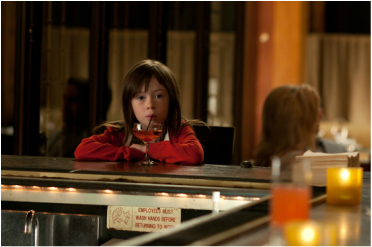Julianne Moore's character in Boogie Nights, Amber Waves, might be a coke-addled porn star, but she would certainly make a better mother than her character in What Maisie Knew. At least Amber wants to spend time with her child. A story of divorce told entirely from the perspective of the very young child-as-football in the middle, Maisie turns out to know quite a lot from all the fights she observes from peeking around doorways and watching people who pretend she's not there.

As the film is told through Maisie's perspective, her relationship to the four adults around her informs how the viewer feels about them. Beale pays lip service to her existence, too consumed with his career to give her his full attention. Susanna treats her as a contemporary, thinking nothing of throwing a raucous party while Maisie is having a sleepover. Maisie's friends are just more guests that the drinking and smoking adults can mingle with. Susanna also is deeply jealous of anyone who would compete with her for Maisie's affections, indicating how tenuous she feels her maternal relationship is. Margo is the prototypical mom, making healthy snacks and doing productive activities. Lincoln is the most interesting within the film and in the broader milieu of independent cinema. He spends an afternoon with Maisie that is highly reminiscent of a pair of twee hipsters frolicking around Brooklyn. Sequences like this, where the characters have a gleeful obliviousness to the crowded city around them, make so much more sense when one of those characters is a young girl and the other is her babysitter trying to entertain her. Other scenes, in which Maisie is stuck at Lincoln's bar, are winning in the same way that Sally Draper making a drink for Don Draper is. Children piercing the veil of the adult world seems more palatable when Lincoln is teaching Maisie how to make a cocktail than when Maisie is stepping over Susanna's drunken party guests. It's instruction versus immersion, and is a contrast that feels true in a perceptive film.
Directing team Scott McGehee and David Siegel put together a strong cast that results in naturalistic performances. Amongst the actors, Saarsgard stands out by transforming his body and manner to match Lincoln's passivity. He's always covering for his height by slumping a little bit to bring himself down to the average person's level, and his voice is small and obsequious. He gradually stands up for himself with Susanna, but not so much that she respects him after. Moore gives her a narcissistic and confident persona, such that it's nearly impossible for her to entertain another point of view. A user of all the people around her, Susanna is totally blinkered but still recognizable, as her motivations come from the aforementioned paranoia about her wavering relationship to Maisie. Coogan is not really treading new ground as Beale, another in a long line of upper class assholes that he's portrayed. Vanderham makes the least impression, though she has great chemistry with Aprile. At the center of the film, Aprile gets by with her soulful eyes, taking in the strange behavior around her. Bewildered by her changing circumstances, Maisie remains friendly in the genuine way that kids can, with a heart big enough for anyone who wants to give her time and attention.
The refrain in What Maisie Knew is a constant Someone Take Care of This Child. Aprile makes the viewer what to enter the film and slap some sense into her selfish parents, so that they might stop thinking only about themselves. Lincoln and Margo can't substitute for the real thing, and shouldn't be expected to. Filmed in heavenly light, a late idyll suggests an alternate universe in which Maisie is higher on an adult's priority list. With a kid like her, that universe shouldn't be difficult to get to. As a story about children but for adults, What Maisie Knew demonstrates how life-changing having a child is, but also why making those changes are worth it. B+
 RSS Feed
RSS Feed